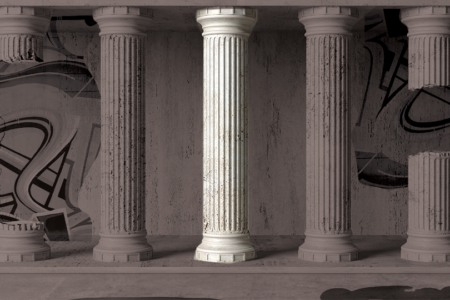The Christian’s Walk
Philippians 3:17–21
The writers of Scripture often used the word walk to describe the Christian’s conduct or manner of life. The apostle Paul instructed Christians to “walk circumspectly [‘carefully’ or ‘accurately’] . . . redeeming the time” (Eph. 5:15–16). In their walks, believers must apply wisdom and discern the Lord’s will, taking every opportunity to be salt and light for Christ, sometimes at their own expense.
Paul continually exhorted believers to glorify the Lord. Although a Christian’s behavior should be marked by wisdom and submission to God’s will, it often is not.
Paul presented two types of walks: a righteous walk and the world’s ungodly, shameful walk.
A Worthy Walk
“Brethren,” he wrote, “join in following my example, and note those who so walk, as you have us for a pattern” (Phil. 3:17). The word brethren refers to Paul’s fellow believers in Christ, not his physical brothers or fellow Jews.
Previously, he instructed believers to pattern their lives after Christ (cf. 2:12–18). But here he said, “Join in following my example.” The word following (Greek, summimetes) is used only here in the New Testament and refers to being a “co-imitator,” one who mimics the likeness of another. Used in the present tense, following indicates an ongoing experience.
Christians should imitate Paul, whom Scripture presents as a model to follow in their conduct, or walk with Christ. Paul wrote by divine inspiration; he was not boasting or being egotistical. He instructed others to imitate him, just as he imitated Jesus Christ (1 Cor. 11:1).
Paul did not mean we should revere him but, rather, that God made him an earthly example for us to follow under Christ. In his epistles, Paul demonstrated how he followed Jesus, taught the churches that he established, and presented what Christians can become by God’s grace.
Paul then wrote, “And note those who so walk, as you have us for a pattern” (Phil. 3:17). The word note (Greek, skopeo) means to mark, observe, or fix one’s eyes on. The apostle wanted the Philippian believers to pay special attention to those who walked according to his example and were maturing in Christ. Many other believers, such as Timothy and Epaphroditus (2:19–30), also set examples by reflecting proper spiritual growth.
The word pattern (Greek, tupon) refers to an engraved impression produced by a die or seal that makes an exact reproduction on a smooth piece of metal. The metal then becomes a mold used to produce coins with the identical image on them. Likewise, believers are to become exact images of Jesus.
Wicked Walk
After teaching how Christians should walk in Christ, Paul presented how Christians ought not to walk: “For many walk, of whom I have told you often, and now tell you even weeping, that they are the enemies of the cross of Christ” (3:18).
In this verse, Paul denounced people whom he identified as “enemies of the cross of Christ” (v. 18). He did not name them and only provided a description that seems to refer either to professing Christians living in sin or unbelievers living as enemies of Christ.
Some commentators believe Paul referred to Judaizers who taught that Gentile believers needed to be circumcised. Others say he referred to the Antinomians, who lived without moral restraint, like the Epicureans. Still others believe Paul alluded to the Gnostics, who taught that religion of the spirit was good but anything done in the flesh was evil. Finally, some believe Paul referred to those who profess to believe in Christ but are not truly saved and live like the world.
Paul “often” (v. 18) alerted the church to these people, indicating the problem they posed was dangerous and widespread. He denounced these evildoers not with glee or gloating but with a heavy heart, “even weeping” (v. 18). The word weeping illustrates deep mourning, like wailing over the death of a loved one. It is apparent these enemies were not true Christians.
The apostle identified them by four characteristics:
Their guilt. “Whose end is destruction” (v. 19). The word destruction signified total physical, spiritual, and eternal ruin or loss. As enemies of the cross, these people’s final destiny was separation from God in the Lake of Fire.
Their god. “Whose god is their belly” (v. 19). Paul used the word belly metaphorically to describe all of their inner sensual, fleshly, bodily cravings or impulses to satisfy their ungodly pleasures (cf. Jude 4).
Their glory. “Whose glory is in their shame” (Phil. 3:19). God and faithful believers were ashamed of those who pursued and enjoyed perversion. Instead of glorying in their lifestyle, these evildoers should have been ashamed of it.
Their grievous thinking. “Who set their mind on earthly things” (v. 19). They concentrated on earthly things, living only for the pleasures of this world. No wonder they were “enemies of the cross of Christ” (v. 18).
A Watchful Walk
While these evildoers focused on earthly things, Paul instructed the Philippian believers to focus on heavenly things: “For our citizenship is in heaven, from which we also eagerly wait for the Savior, the Lord Jesus Christ” (v. 20).
These Christians could easily identify with Paul’s teaching about heavenly citizenship. Philippi was a Roman colony far from Rome. Although most Philippians had never visited Rome, they highly prized their Roman citizenship.
Many Philippians were retired Roman soldiers who wore Roman clothes, spoke Latin, were ruled by a Roman-style government, and practiced Roman justice. No matter where they traveled or lived, their conduct matched and reflected their Roman citizenship.
Paul contrasted the hopeless future of the lost with the hopeful future of believers. Christ’s earthly enemies are destined for hell and the Lake of Fire, but believers are destined for heaven because their citizenship there is already secured.
Christ is now in heaven, preparing dwelling places for those who belong to Him; and He has promised to come again and bring them to their heavenly home (Jn. 14:1–3). A believer’s earthly life is temporary, but heavenly citizenship is eternal (2 Cor. 4:18).
Therefore, Paul said, “We also eagerly wait for the Savior, the Lord Jesus Christ” (Phil. 3:20). The phrase eagerly wait (Greek, apekdechomai) indicates waiting with great expectation for something. Christians expect Christ to come at any moment. Rather than being inactive and idle, believers should be busy serving the Lord while they wait. Thus, their anticipation of the Lord’s coming should motivate their godly lifestyles.
When He returns, Christ “will transform our lowly body that it may be conformed to His glorious body, according to the working by which He is able even to subdue all things to Himself” (v. 21). “Lowly body” refers to our imperfect bodies of humiliation—our natural bodies that are filled with disease and decay and that eventually will die. Our mortal bodies are natural, sinful bodies descended from fallen Adam. But at Christ’s coming, we will be made perfect and given new bodies like Christ’s resurrected body, prepared for eternity (1 Cor. 15:47–57).
Christians’ bodies will be fashioned and glorified like the Lord Jesus Christ’s body. They (1) will never suffer decay or have physical or mental limitations; (2) will be fashioned and fit for the heavenly city in which Christians are already citizens (1 Jn. 3:2–3); and (3) will be redeemed, restructured, and redesigned to function like Christ’s resurrected body in character and capacity.
Thus, these new bodies will not be limited in their abilities. We will receive our glorified bodies at the Rapture of the church, which Scripture teaches could occur at any moment (1 Th. 4:13–18).
Our citizenship in heaven gives us great hope and assurance while we live in a corrupted world. We must stand steadfast in Christ with confidence and joy, walking circumspectly and redeeming the time as we look forward to Christ’s soon return for us.









Great article as always!